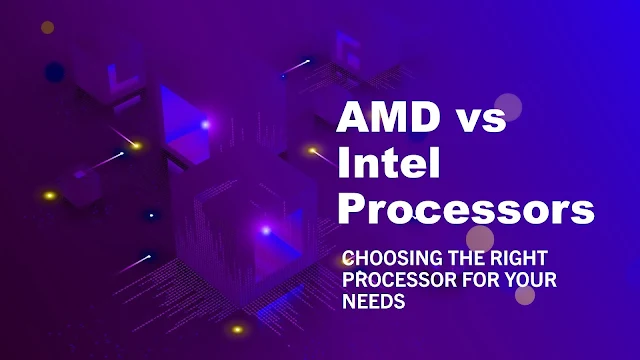When it comes to choosing a CPU for your computer, AMD and Intel are the two giants in the industry. Both companies have long been competitors in the CPU market, offering a wide range of processors tailored to different needs, from gaming and content creation to everyday computing. In this article, we’ll compare AMD and Intel processors, highlighting their strengths and weaknesses to help you make an informed decision.
AMD Processors
AMD, short for Advanced Micro Devices, has been a significant player in the CPU market for decades. With the introduction of the Ryzen series in 2017, AMD revolutionized the industry by offering processors with high core counts, strong multi-threaded performance, and competitive pricing. The Ryzen series, particularly the Ryzen 5, Ryzen 7, and Ryzen 9 models, has gained popularity among gamers, content creators, and professionals alike. AMD’s processors are built on advanced manufacturing processes like 7nm and 5nm, which contribute to their excellent power efficiency and performance-per-watt ratios. Additionally, AMD’s APUs (Accelerated Processing Units) combine CPU and GPU capabilities, offering impressive integrated graphics performance, making them ideal for budget builds.
Intel Processors
Intel, a pioneer in semiconductor technology, has long been a dominant force in the CPU market. Intel’s processors are known for their strong single-core performance, which translates into excellent gaming performance and efficiency in tasks that rely on higher clock speeds. The Intel Core series, including Core i3, i5, i7, and i9 processors, has been a staple in the market for years, delivering reliable performance across a wide range of applications. Intel has also made significant advancements in manufacturing technologies, with recent generations built on the 10nm and 7nm processes, improving power efficiency and multi-core performance. Intel’s integrated graphics solutions, particularly the Iris Xe series, have also seen significant improvements, making them suitable for everyday tasks and light gaming.
AMD vs. Intel Processors Performance
AMD Processors: Known for offering excellent multi-core performance, AMD processors are particularly strong in tasks that benefit from parallel processing, such as video editing, 3D rendering, and multitasking. The Ryzen series, especially the Ryzen 7 and Ryzen 9 models, excels in multi-threaded workloads, making them ideal for content creators and professionals.
Intel Processors: Intel processors traditionally dominate in single-core performance, which is crucial for gaming and applications that rely on fewer cores but higher clock speeds. The Intel Core i5 and i7 processors are popular among gamers for their superior gaming performance. With the latest Alder Lake and Raptor Lake architectures, Intel has also improved its multi-core performance, narrowing the gap with AMD.
AMD vs. Intel Processors Price-to-Performance Ratio
AMD Processors: AMD has built a reputation for providing a better price-to-performance ratio, especially in the mid-range and high-end segments. Ryzen processors typically offer more cores and threads at a lower price point compared to their Intel counterparts, making them an attractive option for budget-conscious users.
Intel Processors: Intel processors are often priced higher, particularly in the high-performance segment. However, with competitive pricing in recent years and the introduction of new architectures, Intel has become more aggressive in offering better value, especially with its mid-range CPUs.
AMD vs. Intel Processors Power Efficiency
AMD Processors: AMD’s Ryzen processors, built on the 7nm and 5nm processes, are generally more power-efficient, offering better performance per watt. This makes AMD CPUs a good choice for those concerned about energy consumption and heat output, particularly in desktop builds where efficiency matters.
Intel Processors: Historically, Intel processors have been less power-efficient, but recent advancements in their 10nm and 7nm process technologies have improved this aspect. However, under heavy workloads, Intel CPUs still tend to consume more power and generate more heat compared to AMD processors.
AMD vs. Intel Processors Integrated Graphics
AMD Processors: AMD’s APUs (Accelerated Processing Units) combine a CPU and GPU on a single chip, offering superior integrated graphics performance compared to Intel’s integrated solutions. This makes AMD APUs like the Ryzen 5 5600G ideal for budget builds that don’t require a discrete graphics card for light gaming or media consumption.
Intel Processors: Intel’s integrated graphics, particularly the Iris Xe series, have improved significantly, but they still lag behind AMD’s integrated GPUs in raw performance. However, for basic tasks and some light gaming, Intel’s integrated graphics are more than adequate.
AMD vs. Intel Processors Overclocking Potential
AMD Processors: AMD’s Ryzen processors are known for their overclocking capabilities, especially on unlocked models. Enthusiasts can often achieve significant performance boosts by manually adjusting clock speeds and voltages. AMD also offers more flexibility in overclocking across its entire range, including mid-range CPUs.
Intel Processors: Intel offers overclocking mainly on its “K” series processors, which are designed for enthusiasts. While Intel CPUs can be overclocked to achieve higher performance, they generally require more advanced cooling solutions due to higher heat output.
AMD vs. Intel Processors Platform and Compatibility
AMD Processors: AMD has been praised for its long-term platform support. For example, the AM4 socket, which was introduced with Ryzen 1000 series CPUs, has remained compatible with newer Ryzen processors, providing users with more upgrade options without needing a new motherboard.
Intel Processors: Intel’s platform support tends to be shorter, with new CPU generations often requiring new motherboards due to socket and chipset changes. This can make upgrading more costly for Intel users, as they may need to replace both the CPU and motherboard.
Conclusion
Both AMD and Intel processors have their strengths, and the best choice depends on your specific needs. If you prioritize multi-core performance, power efficiency, and better value for money, AMD’s Ryzen processors are an excellent option. On the other hand, if single-core performance, gaming, and overclocking potential are more important to you, Intel’s Core processors are a strong contender. Consider your primary use case, budget, and future upgrade plans when making your decision.

Comments
Post a Comment